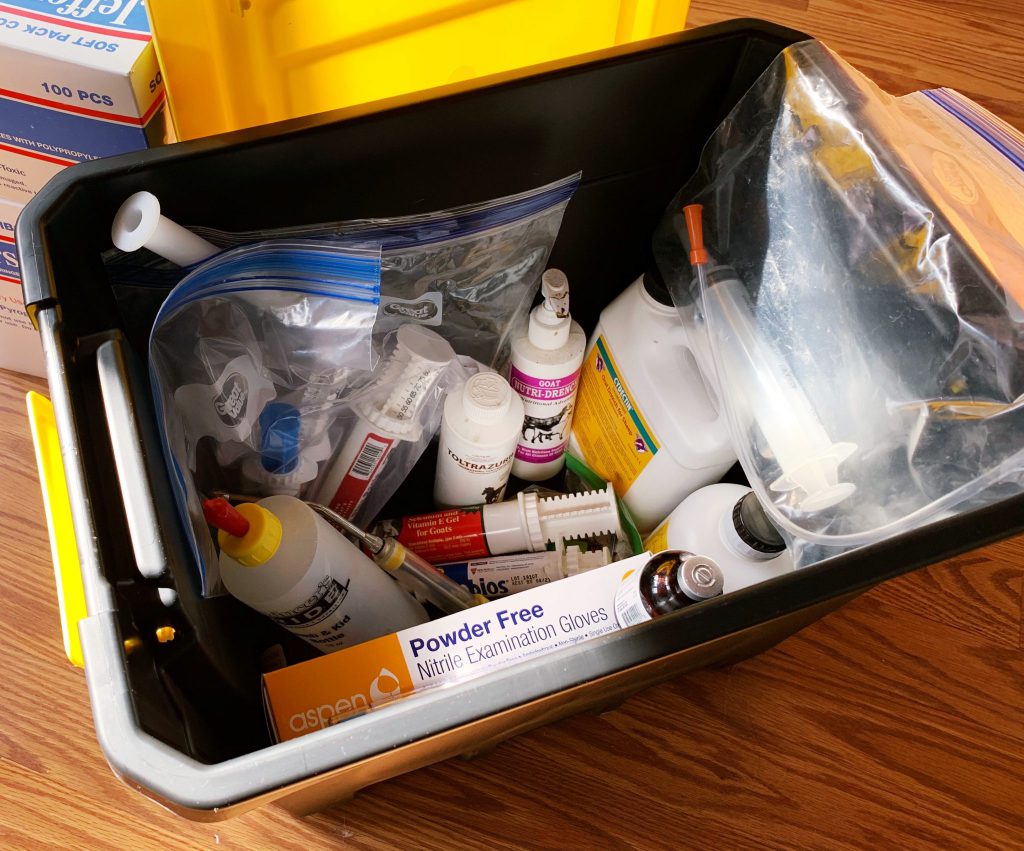As we prepare for kidding season to begin, I am replenishing our kidding kit so I’m confident we have everything we need on-hand. In the past, (knock on wood!) we’ve had very easy births and haven’t had to use most of the items in our kit. However, I like the peace of mind in knowing the items are available if I need them!

Must-Haves for a Basic Kidding Kit
The following is a list of the bare minimum items I consider must-haves to have on hand during kidding season. For that matter, many of these items are good to have on hand year-round for your goats! Many of them (e.g. towels, flashlight, dental floss) are likely things you have around the house already.
I recommend storing all of these items in a tote bag, bucket, or plastic bin so you can grab-and-go as soon as you observe a doe in labor.
- Phone numbers for your veterinarian and/or trusted goat mentors. First and foremost, you always want to have your phone and emergency numbers close at hand, just in case! If you have a veterinarian you work closely with, it’s sometimes not a bad idea to give them a heads-up when you expect your kidding season to begin, so they’re aware you may be calling.
- Exam gloves. We keep a big box in our milk room adjacent to the barn because you never know when you may need them.
- Lubricant. Used for assisting births. There’s no need to buy a veterinary-specific brand; a tube of KY Jelly will work just fine.
- Clean towels or puppy pads. We round-up old, raggedy towels from our family and friends on a regular basis. As long as they’re clean, they needn’t be pretty! They come in handy for placing under a doe as she’s giving birth and/or they can be used to help clean and dry the kids after they are born.
- Paper towels. Again, like the towels and puppy pads, these always come in handy for clean-up!
- Flashlight and/or headlamp. I find headlamps to be especially helpful because quite often you have both hands busy assisting a doe in labor and no one to hold a flashlight for you!
- Thermometer. This is something that should be in your general medical kit for your goats no matter what.
- Syringes and needles. I keep big boxes of the syringe/needle sets from Jeffers in 22g/3cc and 18g/12cc sizes on hand at all times and use them throughout the year for CD&T vaccines and other medications.
- Drenching syringe. Should you need to administer any medications orally, these come in handy! You can also use a regular syringe with the needle removed, but a drenching syringe has a nice long tip on it that makes it easier to get to the back of the goat’s mouth without getting your fingers chomped!
- Betadine surgical scrub. Good for dipping navels and disinfecting should you need to assist with a birth.
- A small cup for dipping navels. Any small cup will do, so long as it’s clean and shallow. (The little 3 oz. paper Dixie cups work great, for a size example.)
- Dental floss. I have actually never had to use dental floss to tie off an umbilical cord before, but I include this in the basic kit because it’s so inexpensive and most people have it on-hand anyway. I like to “borrow” the free floss that my kids get at every dental visit for my goat kit.
- Surgical scissors. For trimming umbilical cords.
- Kid colostrum replacer. You never know when a doe might reject a kid, or (heaven forbid) be unable to nurse. You should ALWAYS have goat-kid specific colostrum replacer on hand during kidding season, just in case.
- Bottles and nipples. Again, if a kid is rejected or a mother is overwhelmed with more kids than she can nurse, you may need to bottle feed. We typically use empty 20 oz. soda bottles with Pritchard teat nipples or black lamb nipples. Other people use inexpensive baby bottles meant for human infants with success.
- Electrolytes. I always keep Manna Pro Goat Elecrolytes on hand, especially in kidding season. As soon as a doe gives birth, I offer her clean warm water with these electrolytes mixed in to help her recover.
- Nutridrench. Nutridrench provides a good boost to does after labor.
- Probiotics. I like the Goats Prefer brand because it has dosing for both adults and newborn kids.
- Vitamin E/Selenium Gel or Bo-Se. The need to give supplemental selenium is highly dependent on your location and feeding program. Selenium overdoses can kill a goat, so they shouldn’t be given without first talking to your veterinarian and having a good understanding of the deficiencies in your area and your specific herd.
Expanded Kidding Kit
As your budget allows, I would recommend adding the following items to your kidding kit as well. Keep in mind that medications have expiration dates, so keep an eye on those and replace as needed.
- Fight Bac. I love Fight Bac and am constantly recommending it. I use it nonstop during milking season to disinfect teats, but people don’t realize that it’s also a good general disinfectant spray that can be used on umbilical cords (as an example) too!
- Kid/lamb puller. I haven’t had the need to use one yet, but I feel better knowing I have one in my kit in case! If you need to assist in pulling a kid, these can help you grip and pull much easier than just using your gloved hands.
- Nasal aspirator. I’ve had good luck just wiping away goop from kids’ nostrils using a paper towel, but if you happen to have an inexpensive bulb-style nasal aspirator, they can be handy as well.
- Tubing syringe kit. Personally, I’m very nervous to use these as I’ve never been trained on how to do so safely — however, in a life-or-death situation, I still feel it is good to have on hand. In my case, I keep one along with the phone number for our 4-H leader and goat mentor close at hand.
- Penicillin G. If you have to “go in” and assist during a birth, it’s typically recommended to give your goat a round of antibiotics afterward.
- Calcium gluconate. Used to treat milk fever, should that be an issue.
- Propylene glycol OR corn syrup and molasses. Used to treat ketosis (or pregnancy toxemia, pre-kidding). You can read more about ketosis here.
Did I miss anything? What are your must-haves for kidding?
